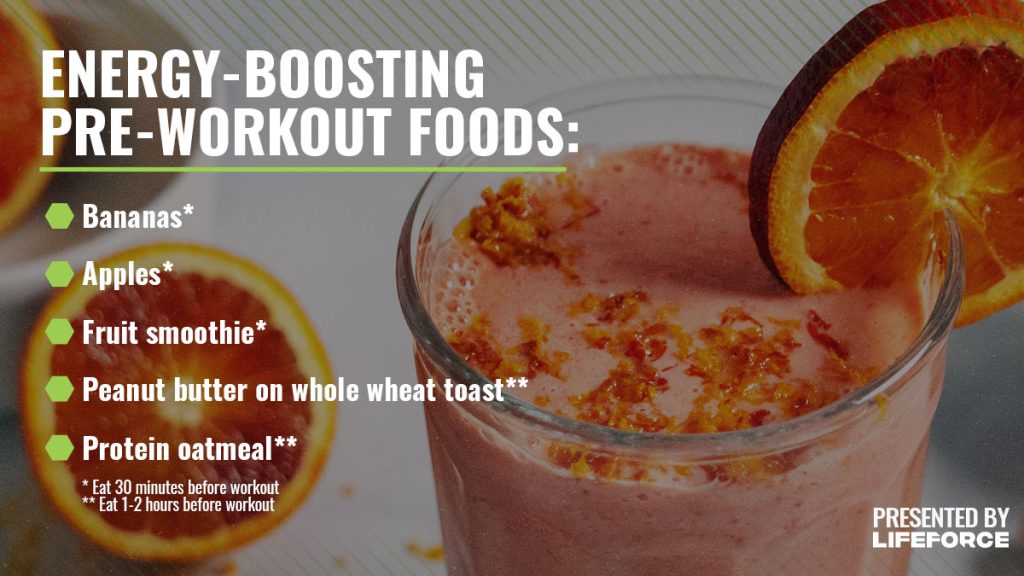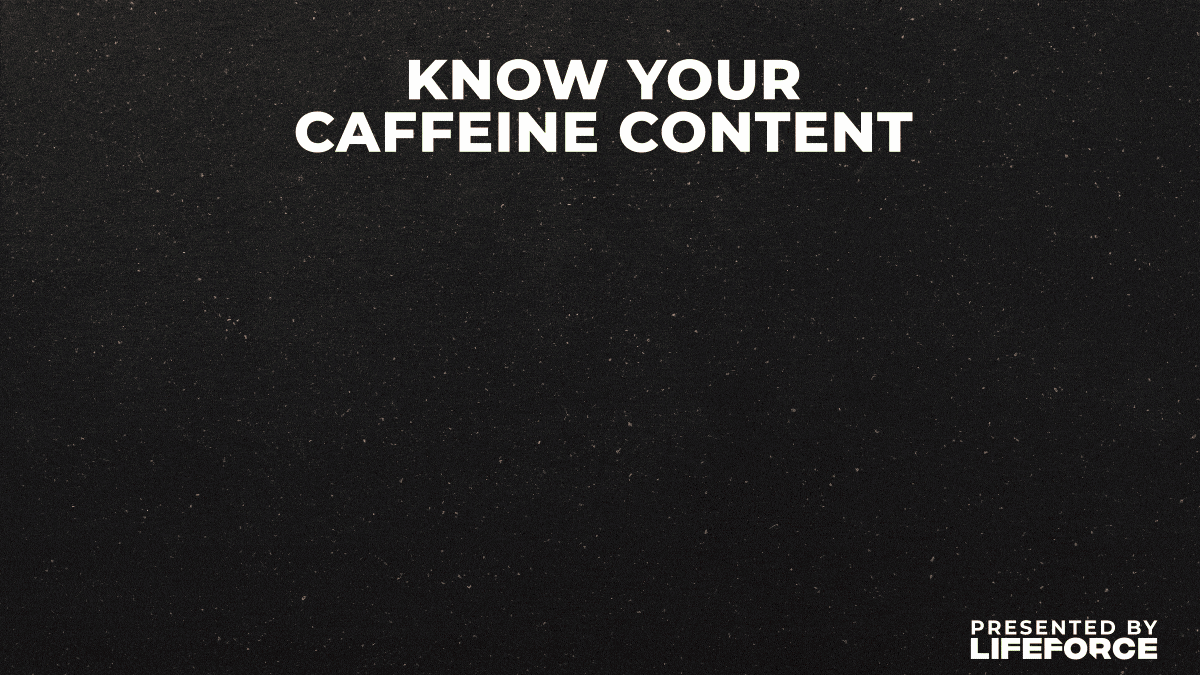Most of us are no strangers to the 3 p.m. slump. Your eyes get heavy, and your attention wanders to things other than the task at hand. Feeling tired and sluggish, you meander over to the office fridge and open it, hoping to find a jolt of energy.
Sure, it’s easy to grab an energy drink that’ll send you into roadrunner mode, but it’s even easier to boost your energy and focus the natural way. Don’t believe it?
That’s exactly why BarBend has teamed up with Lifeforce, a proactive healthcare platform with its own line of advanced supplements, to run down seven slump-busting tips to improve your energy and focus naturally.

Get an early start on your New Year's health resolutions by taking advantage of Lifeforce's diagnostic services. Use the code BARBEND40 to get 40% off your diagnostic when you start your Lifeforce membership.
7 Ways to Naturally Boost Your Energy and Focus
- Exercise Regularly
- Eat the Right Foods
- Don’t Ignore Those Micronutrients
- Go on a Walk
- Prioritize Sleep
- Control Your Stress
- Put Your Phone Away
Exercise Regularly
Yes, yes. We all know regular exercise is good for us. Cue the collective eye roll. However, did you know that exercising can also increase your overall energy?
According to a 2022 study in Frontiers in Psychology, “acute exercise (i.e., a single bout of exercise for about 20–40 min) consistently increases feelings of energy.” (1) The study continues by saying that doing over 20 minutes of low- to moderate-intensity exercise is the key to reaping the energy benefits of movement without causing fatigue.
Here’s the flip side: If you’re hitting it hard every single day at the gym, you might be making yourself more tired. It’s important to balance doing higher-intensity exercise with gentle, recovery-based movements. However, it’s safe to say you generally shouldn’t avoid high-intensity movement altogether.
Another study done by Frontiers in Psychology showed improvement in the “speed of information processing” when the person regularly did high-intensity exercise. (2) And if you’re more into a moderate pace of exercise? No problem! The same study goes on to say a person’s “working memory and cognitive flexibility” improves with this type of movement.
Eat the Right Foods
You probably understand that carbs are the backbone of your body’s energy production, but not all carbs are created equal. Simple carbs like white bread, sugary cereals, and sodas can actually lead to a sugar crash in the hours after consumption. Instead, choose complex carbs when possible, as they take longer to break down in the body and, therefore, provide more sustained energy.

Since complex carbs are digested slowly, they don’t spike your blood sugar. So if you’re looking for energy-boosting carbs, grab a bowl of oatmeal, a sweet potato, or a scoop of quinoa. Choosing complex carbs like these will keep your blood sugar steady and help you feel full for longer.
But what about focus? Per Harvard Health, eating fish (think salmon), greens (spinach), and walnuts have all shown positive effects on cognitive function, whether that is memory or concentration.
And the reasons why are fascinating. The brain and the gut are constantly communicating with each other through neurotransmitters, which can be affected by what you choose to eat. And foods like the ones mentioned above have things like vitamins, healthy fats, and folic acids that are beneficial for neurotransmitters. Translation? If your gut is happy, your brain probably will work optimally, which means better focus for you.
Don’t Ignore Those Micronutrients
Even with the best of intentions, it can be easy to miss some micronutrients in your day-to-day diet. As a quick refresher, micronutrients almost entirely come from consumables, so your body isn’t naturally producing many of these.
While a good diet is the best way to get what you need, you can supplement your micronutrient supply with things like vitamins. Lifeforce’s Peak Rise supplement can potentially help here. It contains a powerful dose of energy-producing B vitamins, along with other key ingredients — like Cereboost®, a potent ginseng extract, and Cognizin®, which can support healthy brain function.
And in case you didn’t know, these trace minerals are pretty important. Per a study from Nutrients, “Micronutrients (i.e., vitamins and nutritionally essential minerals) influence and support every stage of the immune response. Deficiencies of micronutrients can affect both innate and adaptive immunity, causing immunosuppression and thus increasing the susceptibility to infections.” (3)
Besides suppressing your immune system, a lack of micronutrients can also contribute to poor focus and energy. In addition to supplements and multivitamins, you can find many vital micronutrients — like B vitamins, zinc, and magnesium — in common foods like red meat, fish, eggs, walnuts, and more. Head here for more.
Go on a Walk
Even on recovery days, walking is an ideal way to get your head and body back in the game. When you walk, you “improve blood flow and lower blood pressure,” per Harvard. Essentially, your body and brain work better because your blood is properly flowing and delivering the things you need.
And if that isn’t enough, a walk as short as 10 minutes can help sharpen your focus. According to the American Psychological Association (APA), “experiments demonstrate that walking boosts creative ideation in real time and shortly after.” Essentially, walking helps the brain relax/not give direct attention to something, which, in turn, helps the brain recoup when real focus is needed.
Prioritize Sleep
If you surveyed adult Americans, you’d probably find most of them bemoaning that they don’t get enough sleep regularly. But how much sleep is really the right amount? Per the National Heart, Lung and Blood Institute, adults should be shooting for between seven and nine hours each night.
Shockingly, our body almost does more in those seven to nine hours than when we’re awake. According to the journal Sleep Science, you’re giving your body time to recuperate from the day when you sleep, which in turn helps you have energy and focus when you’re actually awake. (4)
“Sleep serves an important function in energy balance by reducing daily energy demands and conserving energy stores,” the study states. “Unlike wakefulness, during sleep, energy expenditure caused by heat use and loss is limited by behavioral adaptations, including the selection of sleep locations.”

If you want better energy and focus in the morning, getting enough sleep the night before is critical. And a lot of us are truthfully shooting ourselves in the foot before our head even hits the pillow. Setting yourself up for success is half the battle in the quest for a good night’s sleep.
To have Sleeping Beauty-level slumber, do the following: Ensure the temperature in your sleeping space is just right, not too hot, and not too cold (à la Goldilocks). Next, put away your phone. Your brain can’t focus on relaxing if you’re watching a string of videos on social media. And finally, listen to brown noise as you focus on your breathing. You’ll also want to limit caffeine after 5:00 p.m. to avoid being too wired once your head hits the pillows.
Control Your Stress
Dealing with your stress appropriately is easier said than done. But, if there’s anything you should get a tight grip on, it’s your stress levels. One, being perpetually stressed means your hormones are always elevated, which leaves your body stuck in “danger mode.” And as you might guess, having your body panicking 24/7 leaves you feeling devoid of energy and unfocused, per the Mayo Clinic.
Plus, if you’re feeling stressed, you might notice that you aren’t able to think clearly. But if you’re calm, you’re usually able to focus on the task at hand. Pro tip: Mindfulness is a great way to deal with your stress while improving your focus. And as mentioned above, going on a 10-minute walk can help here, too.
Put Your Phone Away
Do you tend to pick up your phone when you really should be doing something else? It’s easy to get distracted by your phone with a plethora of entertainment options at your fingertips. However, there are downsides to the fun that is messing with your phone.
Per Front Psychol, “mobile phone usage limits the cognitive ability of the user so that they are not able to focus on daily routine activities which leads to negative psychological well-being.” (5) Essentially, you might be so focused on seeing what your bestie posted on social media that you completely lose your train of thought on something actually important.
Putting your phone away can also help with energy. Sans phone, your sleep won’t be encroached upon, which we’ve established is a critical part of feeling energized. So, putting your phone away can lead to better sleep and, therefore, more energy the following day.

Get an early start on your New Year's health resolutions by taking advantage of Lifeforce's diagnostic services. Use the code BARBEND40 to get 40% off your diagnostic when you start your Lifeforce membership.
Power Yourself Up
So, next time you’re feeling like a slug on hot pavement, choose one of these natural ways to improve your energy and focus. For an extra boost, check out Lifeforce’s line of supplements that help support your focus and energy levels, including Peak Rise and Peak NMN.
Head here to get started.
References
- Wender CLA, Manninen M, O’Connor PJ. The Effect of Chronic Exercise on Energy and Fatigue States: A Systematic Review and Meta-Analysis of Randomized Trials. Front Psychol. 2022 Jun 3;13:907637. doi: 10.3389/fpsyg.2022.907637. PMID: 35726269; PMCID: PMC9206544.
- Mandolesi L, Polverino A, Montuori S, Foti F, Ferraioli G, Sorrentino P, Sorrentino G. Effects of Physical Exercise on Cognitive Functioning and Wellbeing: Biological and Psychological Benefits. Front Psychol. 2018 Apr 27;9:509. doi: 10.3389/fpsyg.2018.00509. PMID: 29755380; PMCID: PMC5934999.
- Pecora F, Persico F, Argentiero A, Neglia C, Esposito S. The Role of Micronutrients in Support of the Immune Response against Viral Infections. Nutrients. 2020 Oct 20;12(10):3198. doi: 10.3390/nu12103198. PMID: 33092041; PMCID: PMC7589163.
- Engle-Friedman M. The effects of sleep loss on capacity and effort. Sleep Sci. 2014 Dec;7(4):213-24. doi: 10.1016/j.slsci.2014.11.001. Epub 2014 Nov 15. PMID: 26483932; PMCID: PMC4608917.
- Chu, J., Qaisar, S., Shah, Z., & Jalil, A. (2021). Attention or Distraction? The Impact of Mobile Phone on Users’ Psychological Well-Being. Frontiers in Psychology, 12, 612127. https://doi.org/10.3389/fpsyg.2021.612127